If you need to shorten your essay by 100-500 words, or even more, you can use one or more of four techniques. You can clean up your sentences, remove repetition, summarize your examples, and/or cut out an entire section.
One of my subscribers recently asked me, “How do I compress an essay of 700-1000 words, or even more, to just 300 words?”
In this tutorial I will show you four easy ways to shorten your essay by as much or as little as you wish. I am giving them to you in the order you should try them out.
Here are four techniques to shorten your essay:
Technique #1: Sentence Cleanup
When I taught essay writing in college, I noticed that students wrote sentences that were just too wordy.
They used 20 words where 10 would have probably done the trick. If you examine your sentences, you’ll often find that you can say the same thing in much fewer words.
Example 1
“In my opinion, there are many people who want to lose weight.”
This sentence contains 12 words.
Here’s how we can shorten it by performing a Sentence Cleanup.
First, you never have to say, “In my opinion,” because if it were not your opinion, you wouldn’t be stating it. Okay? So, let’s cross out “in my opinion.”
“In my opinion, there are many people who want to lose weight.”
We just cut out three words.
Next, the phrase “there are” is usually unnecessary, and if you take it out, your sentence will become more elegant. So, let’s do it. Let’s just cross it out.
“There are many people who want to lose weight.”
We also have to cross out the extra word “who” because it is only needed if you use “there are.”
We just got rid of three more words.
And so our sentence becomes:
“Many people want to lose weight.”
How many words is that? That is now a six word sentence. Guess what – we just cut this sentence in half.
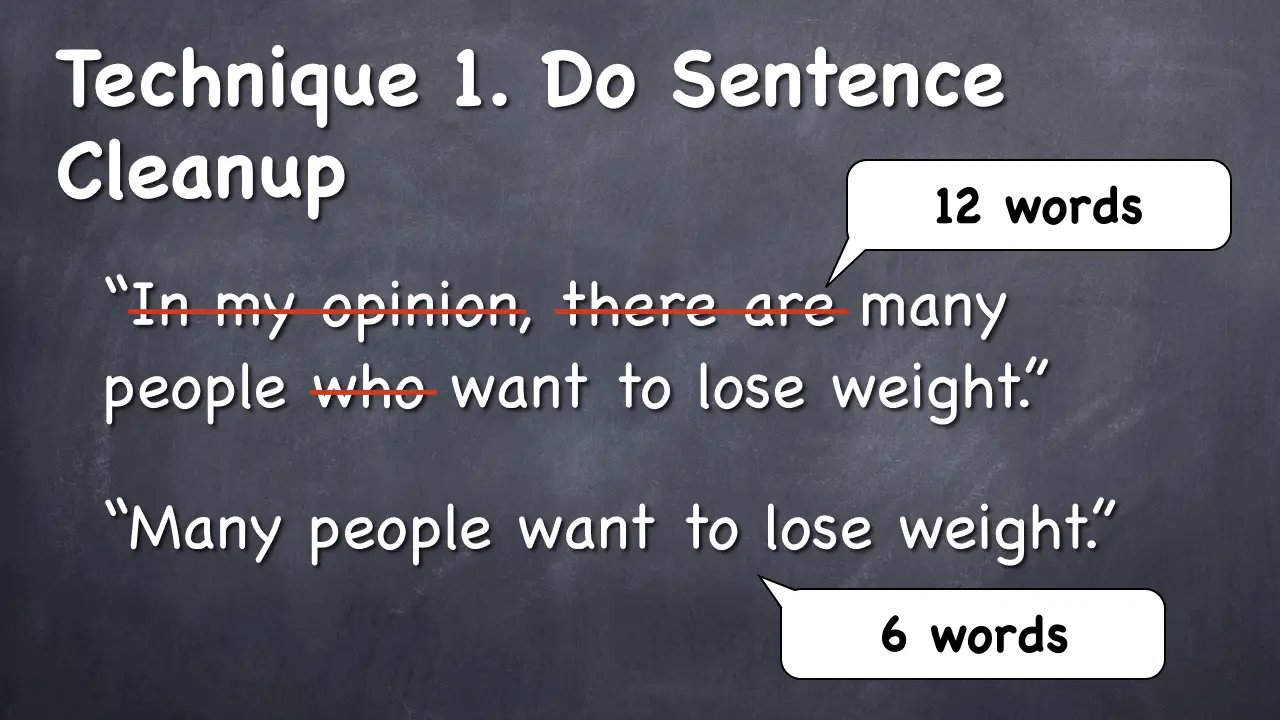
Do this enough times in your essay, and it will get a lot shorter.
Example 2
“How do I cut out 200 words from my essay to make it shorter?”
This sentence contains 14 words. Let’s perform a Sentence Cleanup.
Notice that it is pretty obvious that to cut out 200 words from an essay will make it shorter. Therefore, stating that you want to do it “to make it shorter” is unnecessary.
If we get rid of that phrase, we’ll cut out 4 words from this sentence and make it a lot more elegant.
“How do I cut out 200 words from my essay to make it shorter?”
Technique #2: Removing Repetition
Repetition can be found on all levels – in a sentence, in a paragraph, or a section. When you reduce or eliminate repetition in your essay, you are making it less redundant. “Redundant” just means repetitive and therefore useless.
In the last example we just did, we eliminated a redundancy from a sentence. And that’s part of a Sentence Cleanup. But you can also find and eliminate entire redundant sentences.
Look for repetitive phrases, sentences, and even passages in your content and remove them.
Students often repeat things over and over, using different words, thinking that they’re writing great content. Those are your opportunities to significantly shorten your essay while improving it at the same time.
Here’s an example from a fictitious student essay. Let’s say the student writes about his trip to Paris and states:
“I found that Parisians are very nice if you talk to them in French.”
And then, in the same or even a different paragraph or section, the following sentence would appear:
“Parisians can be very nice people, but they really prefer that you speak French with them.”
Well, the two sentences say the same thing, just using different words.
So, what do you do?
Pick the longer sentence and just delete it.
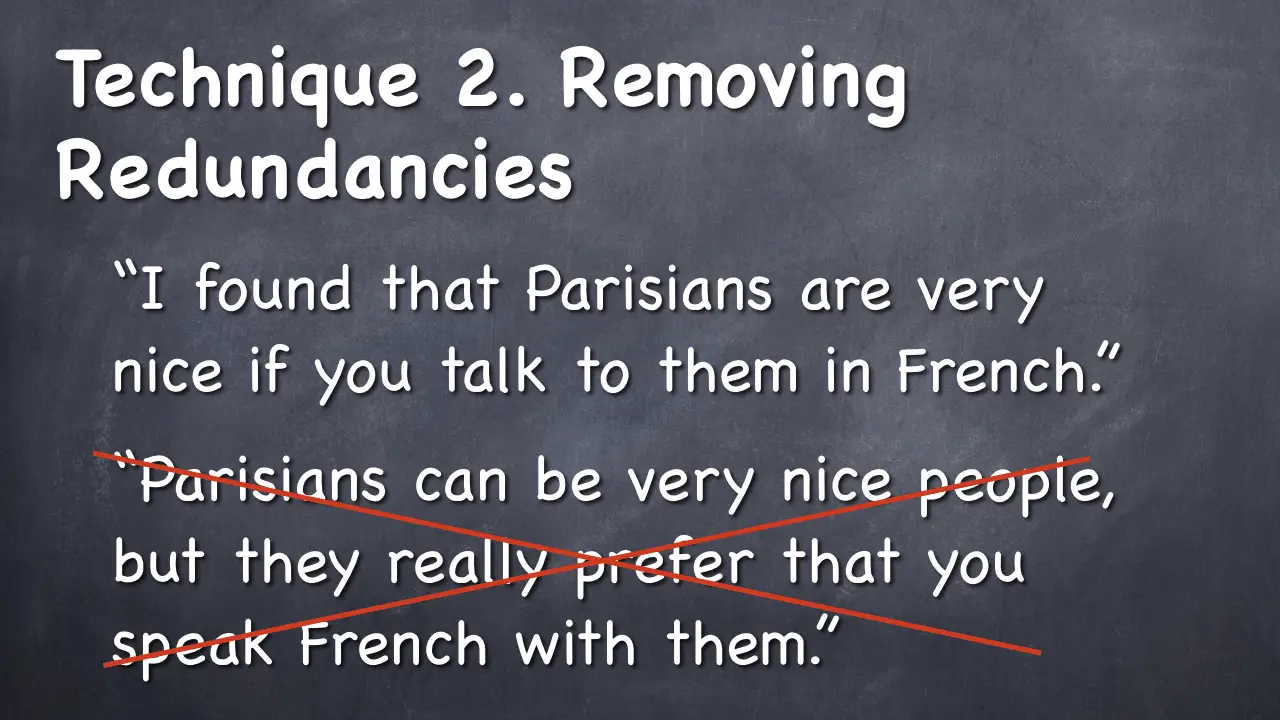
Sometimes you will find a whole paragraph in your essay that is repetitive and can be removed without the essay losing any meaning. If you find such a paragraph, just delete it.
Technique #3: Zooming Out
Make sure that you go through your essay using the first two techniques before you employ this and the next one.
The only case where you would do Zooming Out first would be if you had to shorten your essay drastically – by 30% or more.
If you’ve cleaned up all your sentences and removed all repetitive content, and you still need to lose hundreds of words, the Zooming Out technique will really help.
Here’s how it works.
You may have heard that in essay writing, you are supposed to proceed from general to specific. Whether you stick to this rule really well in your essay or not, I want you to notice something.
In your essay, you make statements that are:
- very general
- less general
- somewhat specific
- very specific
The most general statement in your essay is the thesis because it summarizes the entire essay. And the most specific parts of your essay are examples.
So, in order to shorten your essay, you can summarize your examples. I call this Zooming Out because you are taking something that was very specific (zoomed in) and making it more general (zoomed out).
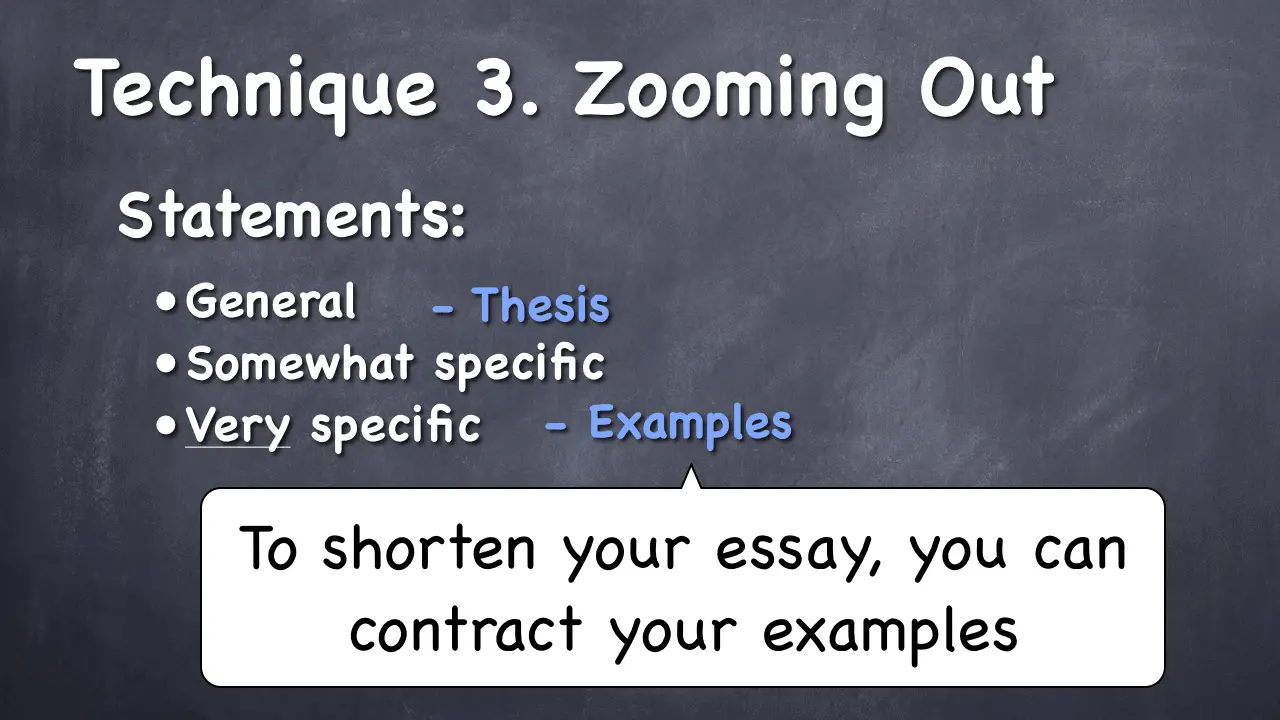
Let’s say you’re writing about the harms of second-hand smoking. And in one of the sections you provide an example of your friend or someone in the news who became seriously ill because she lived with a smoker for a long time:
“My friend Isabelle was married to a chain smoker. Her husband refused not only to give up his habit but even to reduce it. As years went by, Isabelle began to notice some respiratory symptoms. At first, she developed a light but persistent cough. Then, she started to feel out of breath more and more often. When she finally went to a pulmonologist, a test revealed that she had COPD, a serious lung disease.”
This example is 74 words long. And this is your opportunity to shorten your essay dramatically.
You can simply contract this example into one short sentence and write something like this:
“A friend of mine developed lung disease after having lived with a chain smoker for twelve years.”
Now, this sentence contains only 17 words. We just cut out 57 words just by Zooming Out on one example.
We are Zooming Out because we are no longer exploring this example in detail. We simply provide a fact without giving a lot of specific information.
So, look for these detailed examples in your essay and just summarize each of them into one short sentence.
Technique #4: Cutting out a Section
This technique works very well to cut out a big chunk of your essay in one fell swoop.
Let’s say that you wrote an essay in which you have four supporting points to prove your main point, your thesis.
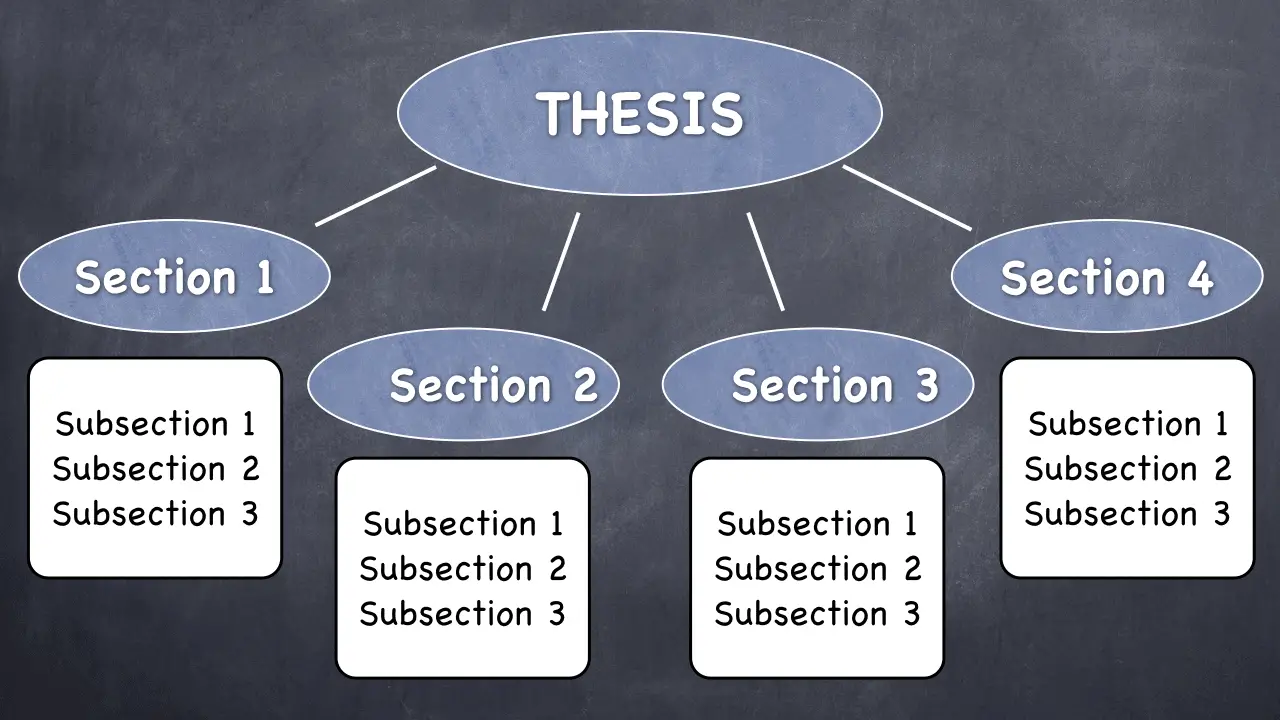
If this is a 2,000-word essay, then each section is approximately 500 words long. But do you really need four reasons/sections to support your point?
Is it possible that if you provide only three supporting points, your essay will still work very well?
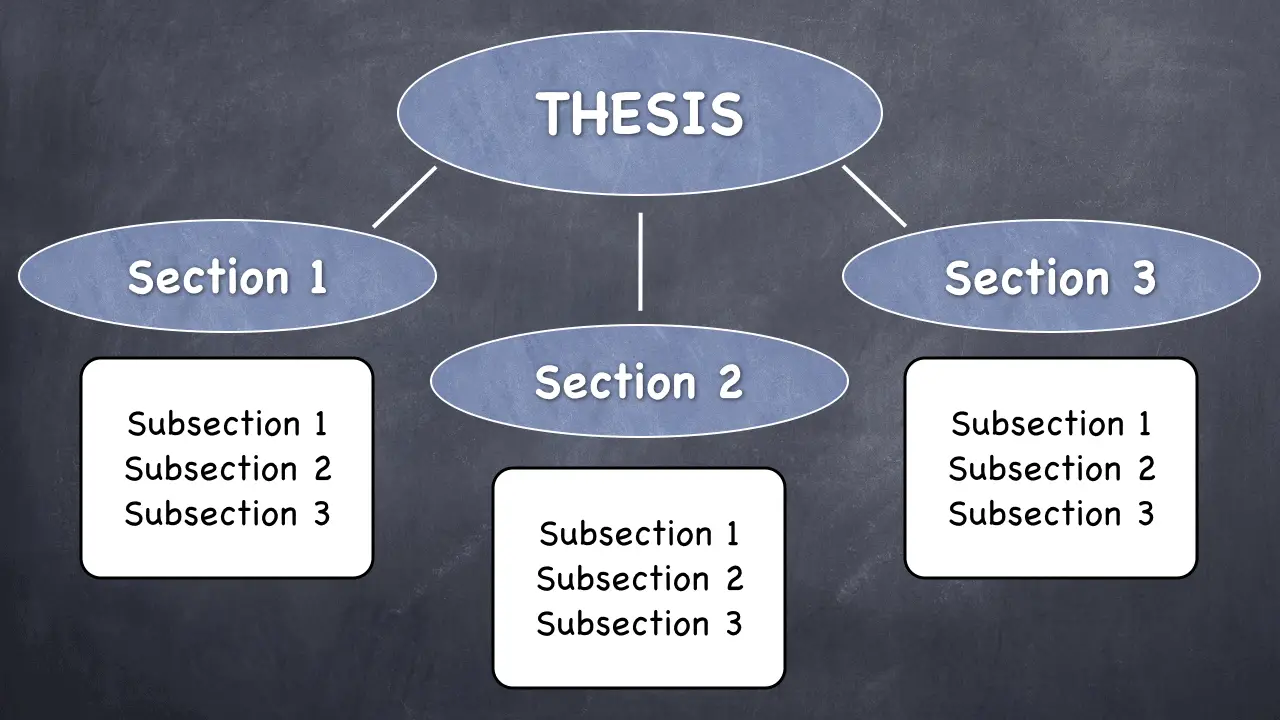
For example, if you argue that apples are a great food, you could have four supporting points, claiming that apples are:
- Delicious
- Nutritious
- Affordable
- Portable
But what if you simply took out one of these points? Let’s say that you eliminate the section about the portability of apples.
Will your essay still work? Sure it will. It will work just fine with the three remaining supporting points. And you just cut out 500 words (in a 2,000-word essay).
After you have cut out a section, make sure to go back to your thesis statement and edit it to reflect the change.
I’ll leave you with one final tip. When trying to choose which sentence, paragraph, or section to cut out from your essay, go for the content that you know is not the best.
For example, you may have a section in your essay where you quote too much. Or, perhaps you were not very careful in paraphrasing, and your passage sounds too much like the original source. These would be great bits of content to get rid of.
I hope this was helpful. Now go ahead and shorten your essay to your heart’s desire!
Tutor Phil
